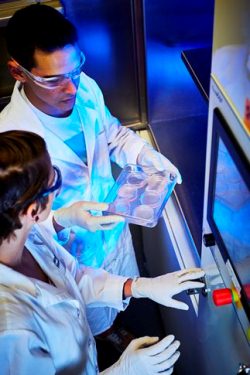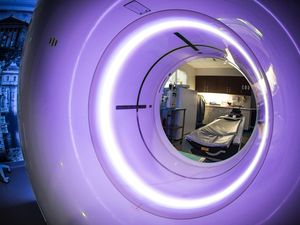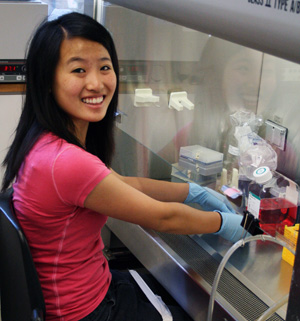Research Groups
Below are the groups that typically host the most students. However, we have also placed students in the Departments of: Bioengineering, Pathology & Laboratory Medicine, Biochemistry, Physics, Neurosurgery, and we are always looking to broaden your options!
Radiation Biology Research
The long-term goal of the Radiation Biology Research Program in the Department of Radiation Oncology at the University of Pennsylvania is to improve the outcome of cancer patients through an improved understanding of how ionizing and non-ionizing radiation interacts with biological tissues, as well as the fundamental processes that dictate the pathogenesis, survival and death of cancer cells in the context of the tumor microenvironment. Multiple investigators are brought together in this program to identify the molecular and physiological pathways influencing the response to treatment of tumors and normal tissues. Ongoing efforts are targeted at developing treatments combining radiotherapy with immunotherapy, optimizing precision (personalized) Radiotherapy and Photodynamic Therapy, and applying innovative imaging approaches to target radiotherapy for improving patient outcome. Our program is unique in the breadth and depth of the research available and in the wealth of collaborative activities, from molecular studies of how the tumor microenvironment influences tumor response to radio/chemotherapy, to translational projects involving animal models, as well as clinical trials, and FLASH radiotherapy. The research in the Radiation Biology Division is truly "bench-to-bedside".
cancer patients through an improved understanding of how ionizing and non-ionizing radiation interacts with biological tissues, as well as the fundamental processes that dictate the pathogenesis, survival and death of cancer cells in the context of the tumor microenvironment. Multiple investigators are brought together in this program to identify the molecular and physiological pathways influencing the response to treatment of tumors and normal tissues. Ongoing efforts are targeted at developing treatments combining radiotherapy with immunotherapy, optimizing precision (personalized) Radiotherapy and Photodynamic Therapy, and applying innovative imaging approaches to target radiotherapy for improving patient outcome. Our program is unique in the breadth and depth of the research available and in the wealth of collaborative activities, from molecular studies of how the tumor microenvironment influences tumor response to radio/chemotherapy, to translational projects involving animal models, as well as clinical trials, and FLASH radiotherapy. The research in the Radiation Biology Division is truly "bench-to-bedside".
Radiology Research
 Radiology research includes basic development of novel instruments and approaches for medical imaging, to translational research designed to move new methods from the bench to the bedside, to clinical trials to using validated methods to answer clinical and biologic questions. Efforts encompass a wide range of modalities - MRI, PET, CT, ultrasound, and optical imaging – and scientific disciplines - instrumentation physics, chemistry for imaging probe development, and the computer science and applied mathematics for image analysis and informatics. Work also includes a range of physiologic systems and disease process that include cancer, cardiovascular disease, musculoskeletal physiology, neuropsychiatric physiology and disorders, and pulmonary medicine. Penn Radiology’s Basic Research Division includes laboratories focused on basic imaging methodology. Our research labs are separated into quantitative, biomedical imaging informatics, and molecular imaging labs.
Radiology research includes basic development of novel instruments and approaches for medical imaging, to translational research designed to move new methods from the bench to the bedside, to clinical trials to using validated methods to answer clinical and biologic questions. Efforts encompass a wide range of modalities - MRI, PET, CT, ultrasound, and optical imaging – and scientific disciplines - instrumentation physics, chemistry for imaging probe development, and the computer science and applied mathematics for image analysis and informatics. Work also includes a range of physiologic systems and disease process that include cancer, cardiovascular disease, musculoskeletal physiology, neuropsychiatric physiology and disorders, and pulmonary medicine. Penn Radiology’s Basic Research Division includes laboratories focused on basic imaging methodology. Our research labs are separated into quantitative, biomedical imaging informatics, and molecular imaging labs.
Radiation Physics Research
.jpg) The long-term goal of the Radiation Physics Research Program in the Department of Radiation Oncology at the University of Pennsylvania is to develop innovative therapeutic solutions for the treatment of human disease. Advancements made towards this goal involves applied physics research in many areas that include high energy proton and photon radiation, use of artificial intelligence (AI) methods, FLASH radiation therapy, photodynamic therapy, dosimetry techniques, and innovative image guided approaches to target radiotherapy for improving patient outcome. Our program is unique in the breadth and depth of the research available and in the wealth of collaborative activities both nationally and internationally as well with industry.
The long-term goal of the Radiation Physics Research Program in the Department of Radiation Oncology at the University of Pennsylvania is to develop innovative therapeutic solutions for the treatment of human disease. Advancements made towards this goal involves applied physics research in many areas that include high energy proton and photon radiation, use of artificial intelligence (AI) methods, FLASH radiation therapy, photodynamic therapy, dosimetry techniques, and innovative image guided approaches to target radiotherapy for improving patient outcome. Our program is unique in the breadth and depth of the research available and in the wealth of collaborative activities both nationally and internationally as well with industry.
Perelman School of Medicine
 The Perelman School of Medicine (PSOM) at the University of Pennsylvania is the oldest and one of the finest medical schools in the United States. The Perelman School of Medicine is rich in tradition and heritage and, at the same time, consistently at the forefront of new developments and innovations in medical education and research. Since its founding in 1765, the School has been a strong presence in the community and prides itself on educating the leaders of tomorrow in patient care, biomedical research, and medical education. The Perelman School of Medicine at the University of Pennsylvania consistently ranks among the top five in US News and World Report’s rankings of research-oriented medical schools. The Perelman School of Medicine is home to 1,900 full-time faculty members, 700+ medical students and 1,000+ residents and fellows, 750+ PhD and another 180+ MD-PhD students, along with more than 700 post-doctoral fellows. The Perelman School of medicine ranks second in the nation among academic medical centers in NIH research funding with an average of $500M in annual support.
The Perelman School of Medicine (PSOM) at the University of Pennsylvania is the oldest and one of the finest medical schools in the United States. The Perelman School of Medicine is rich in tradition and heritage and, at the same time, consistently at the forefront of new developments and innovations in medical education and research. Since its founding in 1765, the School has been a strong presence in the community and prides itself on educating the leaders of tomorrow in patient care, biomedical research, and medical education. The Perelman School of Medicine at the University of Pennsylvania consistently ranks among the top five in US News and World Report’s rankings of research-oriented medical schools. The Perelman School of Medicine is home to 1,900 full-time faculty members, 700+ medical students and 1,000+ residents and fellows, 750+ PhD and another 180+ MD-PhD students, along with more than 700 post-doctoral fellows. The Perelman School of medicine ranks second in the nation among academic medical centers in NIH research funding with an average of $500M in annual support.

